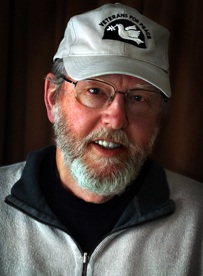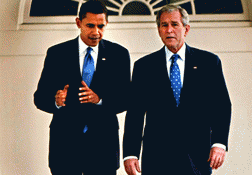According to a New York Times analysis, Turkey and Iran are rising in regional influence as the United States is falling. And let's not forget, arguably the single-most important historical act that boosted Iran to this level of regional influence was the 2003 US invasion and occupation of Iraq.
"The jockeying might be a glimpse of a post-American Middle East," writes Anthony Shadid in the Times analysis.
Still, you have to admire US leaders for their talent and tenacity in never publicly recognizing the obvious. George Bush, of course, was an underestimated master at this.
He and his gang of cutthroats stumbled around in the world like drunken fat men knocking over furniture and vomiting on the couch. Then, at the press conference when a reporter asked if there was anything he could say had been a "mistake," he'd give us that famous vacant look
"Gee. I'm thinking," he'd say with an aw-shucks grin and a shy chuckle. "I'm trying but I just can't come up with anything right now." Another chuckle and a little shrug. Then: "I'll take it under advisement and get back to you in a couple decades."
In other words, "Buzz off and leave me alone. I'm the leader of the free world. I don't make mistakes. I make history."
Now, of course, we have a man in the White House who most everybody agrees is a smart guy -- even those who insist he's a Third World Manchurian Candidate.
Mr. Obama doesn't play the same coy public games Mr. Bush played. His game revolves around the idea that all the mistakes were made by Bush, but since they are now so institutionalized that they constitute The-State-Of-America-Today, to rock the boat would only damage the nation. And no American President can get very far -- like be re-elected -- by doing anything that might be characterized as hurting America.
What is "America" but the bright and shining accumulation of 235 years of decisions and campaigns that left a lot of death, wreckage and collateral damage in their wake? So Mr. Obama's modus operandi to stay afloat and get ahead in this great churning enterprise is to go with the flow, since those who try to dam the flow or swim against it only get battered and smashed by the flotsam and jetsam rushing down-river. Better to be forward-looking.
Frank Rich of The New York Times described this top-down, power-driven national process nicely. Specifically, he was speaking about how our government and media were addressing the aftermath of the Tucson shooting. Rich picks it up at the close of President Obama's beautiful speech in Tucson:
"As soon as the president left the podium Wednesday night, we started shifting into our familiar spin-dry post-tragedy cycle of the modern era -- speedy "closure,' followed by a return to business as usual, followed by national amnesia."
We certainly saw that cycle at work following the economic collapse in the middle of the 2008 election campaign. Greed has, maybe, been tempered ever-so-slightly -- but not enough to put a damper on the profit-driven market, which was, of course, bailed out (that "closure" thing) with many hundreds of billions of our tax dollars. The poor and the working middle class were left to struggle to keep their homes and their jobs, which was deemed good for their character.
Closure in this case applies to soothing the beast we might call "the American Street," to borrow a popular phrase from the Arab world. The Wall Street pundits are no doubt correct when they assure us that if the high-finance economy had been left to the whims of the worshiped free market the wreckage might have been much worse -- like of such destabilizing, revolutionary intensity that, while some hair would have been mussed, real change of some sort might have happened.
As it stands, the American Street is confused and divided and fighting amongst itself, which is no doubt just fine with those in the moneyed financial class.
The current street revolution in Tunisia seems quite instructive. We are told that Tunisia's 23-year-long tyranny led by President Zine el-Abidine Ben Ali was so tight a bunch of corrupt thugs that the well-educated nation with a healthy middle class was ripe for the bottom-up eruption we're now seeing.
(Note: You can view every article as one long page if you sign up as an Advocate Member, or higher).





